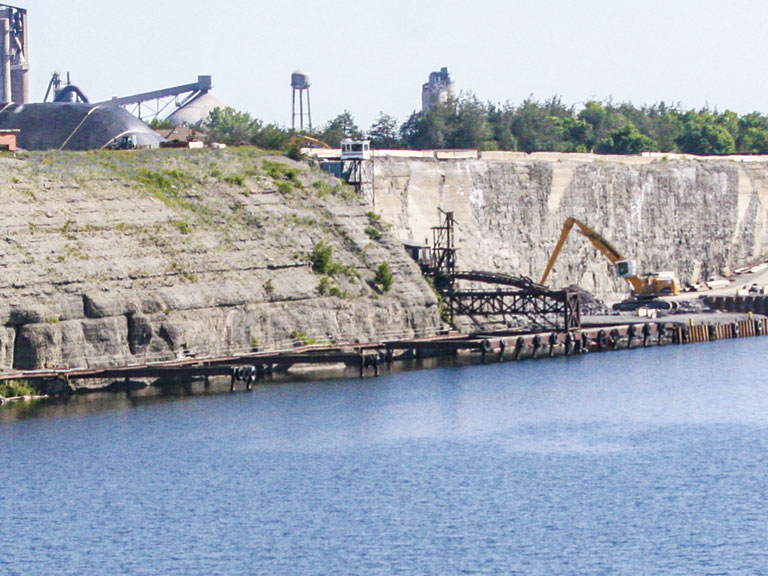County News
Condition of the Terminals

Environment ministry answers pressing questions as terminals take off
The town of Picton straddles one of the many bays and reaches running along the County’s east end that give this island community its recognizable shape. Along the bays north side, below Whitechapel Road, a massive red freighter sits docked at the Picton Terminals, adding to the industrial landscape that includes the cement plant further along the bay.
The Picton Terminals began loading limestone onto the ship this week, using a refurbished ship loader that had once sat abandoned at the site of the old shipyard since the early ’80s.
Ben Doornekamp, whose family purchased the property two years ago, is proud of the work. The limestone is a product of site grading at the port, and while it has piled up into an eerie mountain along the south side of Whitechapel, now it will go to fill parts of the 401 near Toronto.
Doornekamp says by shipping the aggregate from the site, the company is saving Ontario infrastructure thousands of tons of weight and thousands of kilometres of travel. The freighter will significantly cut the distance the limestone will have to travel by road. It will bypass the County completely.
“Instead of 800 truckloads travelling three and a half hours round-trip to service a project, Picton Terminals has provided a marine option, where trucks only travel 20 minutes round-trip to service a project,” Doornekamp wrote in an email to The Times.
Despite this, residents living near the Picton Terminals are worried and frustrated. The company has made a lot of mistakes, they say, to the detriment of the environment and of their properties.
The company’s operations have begun to ramp up as the County plans to install a new water intake pipe further down the bay, specifically to avoid water contamination in the busy, shallow bay. It will be the County’s responsibility and cost to take any measures to avoid contamination, even if that is caused by the terminals.
And neighbours have complained of excessive salt in their ponds and in the bay from piles of road salt stored at the site for shipping and to sell to the County. And this fall, the owners of one nearby property discovered everything on it covered in a fine, black soot. That turned out to be petroleum coke. Pet-coke, a processed petroleum product that is made into a fine powder, is used for many things. In this case, it was for making cement.
Gary Wheeler, a spokesperson from the provincial Ministry of Environment and Climate Change (MOECC), confirms the validity of these complaints.
“The ministry has been recently involved with two issues at Picton Terminals,” Wheeler says. “In September 2015, storm water samples collected from the Picton Terminals site and neighbouring property showed high concentrations of chloride and sodium. As a result, we asked the company to prevent the discharge of salt into the environment by implementing best management practices for salt storage and managing the stormwater runoff at the site.”
Wheeler says the company took the appropriate action at the time, covering the salt piles and removing excess salt. This August, the MOECC took another sample, which is being reviewed.
Along with the cleanup, the MOECC required Picton Terminals to apply for a Stormwater Management Works Environmental Compliance approval, which they did in May of this year. That approval is pending the County’s rezoning of the site.
To date, the Picton Terminals is not zoned to allow for use as a shipyard. Upon amalgamation, the zoning changed to quarry, limiting the company’s use of the site. Doornekamp says they are in the process of changing it back, pending public consultations and future planning meetings.
“The application is on hold until the site has the proper municipal zoning in place and the company can demonstrate that the proposed stormwater management works, coupled with best management practices for salt storage, would be effective in mitigating sodium and chloride discharges from the property,” says Wheeler. “The ministry has conducted follow-up site visits and attended numerous meetings with the company, Environment Canada, Quinte Conservation and Prince Edward County to discuss the management of stormwater runoff at the site. We will continue to visit the site and meet with the company to ensure contingencies are in place to minimize runoff from the site.”
Wheeler also confirmed that a complaint to the MOECC on October 10 resulted in the company paying to clean up the complainant’s property and covering the pet-coke with tarps to prevent future contamination before the material is removed.
“The ministry has asked the owner of Picton Terminals to provide an action plan identifying the preventative measures that will be taken when the material is removed,” says Wheeler. “[We take] all public concerns seriously and we will continue to monitor the situation as necessary.”
Residents are also worried that Picton Terminals is considering transporting waste through the port facility. Wheeler confirmed there there have been discussions about this possibility, but that to date, the Picton Terminals had put the application process on hold, and so it is not clear if they will proceed.

Comments (0)